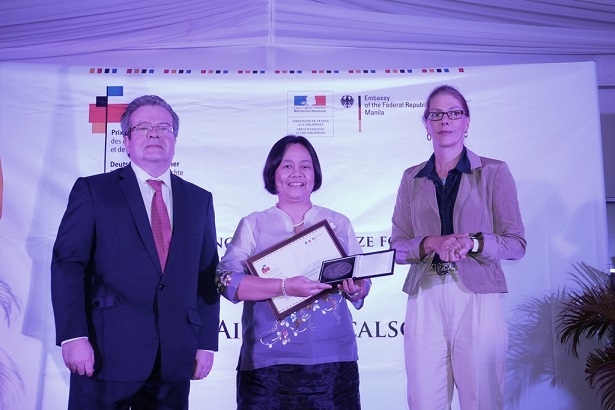
It could not have been given to a more deserving person.
Last Dec. 12, two days after the universal observance of International Human Rights Day, human rights advocates gathered at the Novotel in Quezon City to applaud the awarding to Aileen Bacalso, the Franco-German Ministerial Prize for Human Rights and the Rule of Law.
Bacalso was one of the 15 in the world who were honored this year for the work they are doing in protecting human rights. The others were: Ales Bialiatski (Belarus), Li Wenzu (China), the Nadim Center (Egypt), Ameha Mekonnen Asfaw (Ethiopia), Robin Chaurasiya (India), Nasrin Sotoudeh (Iran), Amina Hanga (Nigeria), Miluska Del Carmen Luzquinos Tafur (Peru), Irina Biryukova (Russia), Delphine Kemneloum Djiraïbe (Chad), Asena Günal (Turkey), Luz Mely Reyes (Venezuela), and Vu Quoc Ngu (Vietnam).
The countries where the other recipients come from is a commentary on the notorious company that the Philippines keeps, despite the fact that the preamble in its Constitution speak of building “a just and humane society.”
The award also underscores the values that France and Germany nurture in these modern times when economic and financial security are vital national interest considerations.
As the French ambassador, Nicolas Galey, said, “This Prize reaffirms the constant commitment of France and Germany to human rights and the rule of law, and helps strengthen their cooperation in this area. “
Galey said, France and Germany may not share a common geography or history with the Philippines, “but what binds us together is our common commitment to the promotion and defense of the democratic and universal values enshrined in the Universal Declaration of Human Rights.”
The German ambassador, Anke Reiffenstuel, opened her remarks with a quote from a recent controversial visitor, U2’s Bono: “You can’t compromise on human rights.”
She shared the vision enshrined in the Universal Declaration of Human Rights which was underscored by Germany’s foreign minister Heiko Josef Maas, in an international conference on “Advocating Human Rights in the21st century” in Berlin on Human Rights Day, which is “All human beings are born free and equal in dignity and rights”.”
Every year since 2016, the Franco-German Ministerial Prize for Human Rights and the Rule of Law has been awarded to individuals or organizations who have made an exceptional contribution to the protection and promotion of human rights and the rule of law in their country and at the international level. The first Filipino to receive the prize was Rosemarie Trajano of the Philippine Alliance of Human Rights Advocates , in 2017.
The award cited Bacalso’s work when she was Secretary-General of the Asian Federation against Involuntary Disappearances and as the focal person of the International Coalition against Enforced Disappearances.
“Ms. Bacalso contributed to the drafting and lobbying of the International Convention for the Protection of All Persons from Enforced Disappearance which was adopted in Paris in 2006,” a press statement on the award said.
In her acceptance speech, Bacalso said, “By establishing the Franco-German Ministerial Prize for Human Rights and the Rule of Law, both governments give a premium to the struggles of human rights defenders and encourage them to continue their noble work. Especially in areas where security is a problem, the award can shield human rights defenders from their precarious work that earns the ire of the perpetrators of human rights violations. This award gives visibility to the struggle against enforced disappearances and other human rights violations everywhere and asserts the imperative of the struggle. In the last three and a half years, human rights defenders including lawyers and church people in our country bear the brunt of persecution.”
Promoting human rights is personal to Aileen. Her husband disappeared in November 1988 at the height of the anti-insurgency campaign led by the Philippine government. During his detention, he was heavily tortured and later, released. Such an experience inspired her to work with victims of enforced disappearances.
She said the situation has not eased up: “The Families of Victims of Involuntary Disappearance has documented 71 cases of disappearances under the Duterte administration’s chilling war on drugs. The figure, which speaks of underreporting and inadequacy of documentation due to the atmosphere of fear, pales in comparison with the actual number of cases. The litany of cases from Marcos to the present Duterte administration that remain unresolved continues to lengthen, although facing a huge challenge on documentation.”
Bacalso shared her award to the families of the disappeared in the country and recognized those who were present during the celebration: “Edita Burgos, whose son Jonas disappeared in 2007 under the Arroyo administration and Mary Ann Burgos, wife of Jonas; Fernando Fortuna, whose son Darryl disappeared on the same year, Daisy Valerio whose husband disappeared at the peak of repression during the Marcos regime, Jimmy Getanis, whose two brothers disappeared during the supposedly democratic government of the late President Corazon Aquino, Erlinda Malicdem whose husband disappeared during the same administration.”
She also dedicated the award “To the desaparecidos, who are spiritually present here: Plucked from the bosom of their families by state agents who profess to provide protection of law;
“Whose memory will never be obliterated despite the passage of time;
“Whose lives were offered on the altar of freedom,
“To them and their struggling families”
Be First to Comment